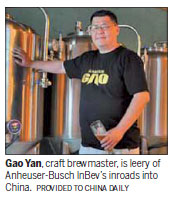
The world's king of beers was late into the game in the US craft beer market. Now it's looking to make sure that doesn't happen again, this time in the world's largest beer market: China.
Anheuser-Busch InBev, maker of Budweiser, Corona and Stella Artois, along with cases of other beers, earlier this month took an undisclosed stake in Boxing Cat of Shanghai, one of China's best-known craft brews. Boxing Cat was founded in 2008 by an American, Gary Heyne, who died in 2010, and two friends.
Belgium-based multinational AB InBev has designs on Chinese brewpubs, especially those trendy ones in Beijing and Shanghai with their much-ballyhooed young, big spenders.
AB InBev's marketing in China of Goose Island, a Chicago craft brew that the beer behemoth bought in 2011, has left some craft brewers in China with a bitter beer face.

A March 16 article on fortune.com, titled China's New Craft-Beer Bully, argued that AB InBev is making a power play in China, taking advantage of regulations that it wouldn't be able to in other markets, such as the US.
For instance, in China, brewers also can own bars - Boxing Cat has three prominent brewpubs in Shanghai.
Fortune.com reports that AB InBev has pressured distributors in China to keep them from serving other craft beers while giving bars incentives to promote Goose Island (one of nine US craft breweries that AB InBev has purchased in recent years), which would not be legal in the US, due to antitrust regulations borne out of Prohibition. AB InBev also reportedly offers lucrative salaries to skim local brewing talent.
AB InBev wants to be a craft-beer brewer," Gao Yan, who owns craft brand Master Gao in Nanjing, told fortune.com. "But they want to act like a big brewer."
"Craft plays an important role in the beer industry. It puts brewers in the spotlight and highlights consumer demand for flavors, provenance and storytelling," Nicky Chen, a spokesperson for AB InBev China, told China Daily. "We are passionate about great beer and believe there is space in the market for a wide variety of products. Investing in specialty and craft brewers in different parts of the world is part of our strategy to build an exciting portfolio of premium brands that can meet the diverse and changing needs of our customers.
"In order to drive sustainable growth in China, we will continue to focus on introducing and developing exciting new products, increasing our operational efficiency and investing in our people, all while engaging our stakeholders to build a better company and a better world," Chen said.
Boxing Cat did not respond to a request for comment.
AB InBev has been in China for decades: "a key market for us for over 30 years", Chen said.
It bought Harbin Brewery in 2004, and Fujian Sedrin Brewery in 2006, and is among the top five beer sellers in China.
Jason Notte, the beer columnist for marketwatch.com, finds some of this David vs. Goliath talk amusing.
"A bunch of US and English expats go to China and start breweries because they can't take the heat in the US, find out that ABI and Goose Island can set up shop there too, cry about it, then take ABI's money," he told China Daily. "I'm so glad the Boxing Cat guy sold because that's clearly what he's been angling for. He's featured in every US story about Shanghai craft beer, and now he's Team ABI all the way. That's glorious."
On March 2, Boxing Cat brewmaster Michael Jordan explained the AB InBev deal to Fortune: "We wanted and needed a partner that shared our vision for growing the craft community as well as having the resources available to do it with the same emphasis and quality that we have always strived to maintain as a brand."
What all this suds business shows is that even when it comes to mom-and-pop brewers, beer is a global business.
"If anything, Goose Island could easily spread all over China as it did here, the UK and elsewhere. That is ABI's plan for that brand- from pubs to ballparks to airlines - and it's working," Notte explained.
"Tsingtao (based in Qingdao) just partnered with Pabst here in the States, and having a Pabst partner like New Holland in Michigan to export to China is a big upside to that relationship," he said.
"(China Resource Snow Brewery Ltd) Snow's position may be a bit compromised now that ABI's deal for SABMiller ended Snow's joint venture, but I still wouldn't be surprised to see Chinese Resource Enterprises or Beijing Yanjing enter the game," Notte added.
(Anheuser-Busch InBev was already the world's largest beer producer when it acquired No. 2 SABMiller for $107 billion in a deal that closed in October 2016.)
Notte said that "when ABI started buying breweries here in the US, MillerCoors, Heineken USA, Constellation Brands and Duvel Moortgat followed. I'd expect a similar reaction in China."
Beer is big business, and sometimes it takes some barroom brawls to determine the champ of the taps.
Contact the writer at williamhennelly@chinadailyusa.com